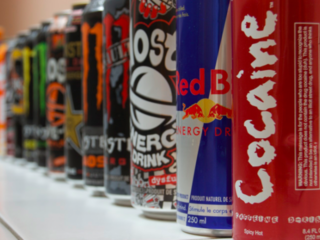Addiction
Energy Drinks, Addiction, and the Brain
Research into taurine reveals a complicated picture.
Posted April 15, 2019
Energy drinks are a multibillion-dollar industry. In the US alone, sales topped $3 billion in 2018 and continue to rise. The familiar brands of Monster, Jolt!, 5-hour energy, and of course Red Bull have been joined by a list of competitors that seems to grow by the month.

Different energy drinks have different formulas, of course, but the key ingredients in most of them are caffeine, which is already familiar to everyone, and taurine, which usually isn't. Taurine is often called an amino acid, but it isn't one in the traditional sense, either structurally or functionally. It is not used by cells to make proteins, for example. Instead, taurine participates in a variety of processes throughout the body from osmoregulation in the kidney to the conjugation of bile acids in the liver.
Taurine is "essential" in the sense that it performs important functions, but it is not essential in the dietary sense because our bodies can make all the taurine that we need. We make it by converting from the precursor cysteine, which is one of the traditional amino acids and one that we can also make for ourselves. In other words, we don't have a nutritional necessity for taurine, but it is found abundantly in all animal products. (Cats, however, have lost their ability to make taurine which is part of why they are "obligate carnivores.")
Taurine is added to energy drinks because it has been widely reported, and confirmed by some studies, that large doses can give us a boost in energy, ability to focus, memory recall, and even athletic performance. It is not entirely clear how it does this, but its effects in the central nervous system seem to be the most likely explanation. Taurine potentiates calcium signaling, which is key to how muscles contract and how neurons communicate with each other, and this seems likely to play a role in taurine's central nervous system effects. But there's definitely more going on that we haven't fully worked out.

Dr. Kaliris Salas-Ramirez of the City College of New York is a scientist that studies the effects of taurine on the brains of mice. Her work has probed this with respect to age, sex, interactions with other drugs, and especially taurine's role in addiction. It has been suggested that taurine may potentiate the effects of some recreational drugs in certain settings, but also help protect against addiction in others. Dr. Salas-Ramirez even has some evidence that taurine may help with memory in older women.
I sat down with Dr. Salas-Ramirez in the podcast studio for an episode of "This World of Humans." As she walks us through the effects of taurine and her research with the mice, a complicated picture emerges. Clearly, more research is needed, but the news is not all bad! Taurine might not be the best thing for young adults to be pumping into their bodies while enjoying other drugs, but it may be good to help people struggling with addiction. Taurine might not be great for kids with developing brains, but it may help older women with memory. The theme of our conversation was, "It's complicated."


